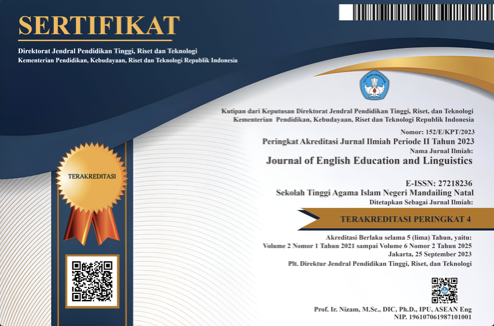IMPROVING STUDENTS` SPEAKING SKILL OF DESCRIPTIVE TEXTS THROUGH MIND MAPPING
DOI:
https://doi.org/10.56874/jeel.v1i1.56Keywords:
speaking skill; mind mapping; descriptive textAbstract
This research aims to measure the implementation of Mind Mapping on Improving Students` Speaking Skill of grade X-2 TKJ of SMK N 1 Panyabungan, Mandailing Natal - Sumatera Utara. The method of this research was Classroom Action Research. The participant in this classroom action research was 44 students of grade X-2 TKJ of SMK N 1 Panyabungan, Mandailing Natal - Sumatera Utara. The instrument consisted of Mind Mapping Practice, Speaking test, observation sheet, and interviews. The data of this research was analyzed two methods of data analysis. Quantitative data analysis was used to examining and interpreting data from Mind Mapping practice and speaking test. The data taken from observation and interview was used qualitative data analysis. The result shows that (1) Mind Mapping better improves the students` Speaking Skill. This can be evidence from the students` means which better gradually improved in cycle one, and two, and (2) the researcher found that the changes of students` speaking skill are influenced by six factors, namely, interesting teaching media, interesting material, attractive classroom activities, enjoyable classroom management, attractive teacher`s approach, teacher strategy.
Downloads
Published
Issue
Section
License
All articles published in the Journal of English Education and Linguistics are licensed under a Creative Commons Attribution-ShareAlike 4.0 International (CC BY-SA) license. This means anyone is free to copy, transform, or redistribute articles for any lawful purpose in any medium, provided they give appropriate attribution to the original author(s) and Journal of English Education and Linguistics, link to the license, indicate if changes were made, and redistribute any derivative work under the same license.
Copyright on articles is retained by the respective author(s) without restrictions. A non-exclusive license is granted to the Journal of English Education and Linguistics to publish the article and identify itself as its original publisher, along with the commercial right to include the article in a hardcopy issue for sale to libraries and individuals.
Although the conditions of the Creative Commons Attribution-ShareAlike 4.0 International (CC BY-SA) license do not apply to authors (as the copyright holder of your article, you have no restrictions on your rights), by submitting to the Journal of English Education and Linguistics, authors recognize the rights of readers and must grant any third party the right to use their articles to the extent provided by the license.

This work is licensed under a Creative Commons Attribution-ShareAlike 4.0 International License.








